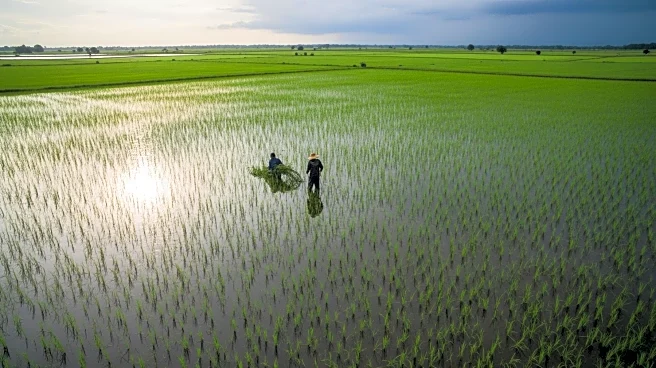What's Happening?
Recent research has highlighted a concerning trend in global agriculture, with extreme flooding events leading to a significant decrease in rice yields over the past three decades. The study, published
in Science Advances, reveals that between 1980 and 2015, rice yields have decreased by an average of 4.3% annually due to devastating floods, resulting in a global loss of up to 18 million tons of rice. The research, led by Zhi Li from the University of Colorado Boulder, utilized a global flood model and satellite data to map the impact of these floods on rice production. The findings indicate that certain regions, particularly in Southeast Asia, have experienced even higher losses, with some areas in China and India seeing up to a 15% annual reduction in rice yields. The study attributes these losses to an increase in the frequency and severity of floods, which are linked to climate change.
Why It's Important?
The decline in rice yields due to extreme flooding has significant implications for global food security and economic stability. Rice is a staple food for over half of the world's population, particularly in Asia, Sub-Saharan Africa, and South America. The reduction in supply could lead to increased prices, making rice less affordable for millions of people. This price increase could have a ripple effect on the global economy, affecting not only consumers but also farmers and businesses reliant on rice production. The study underscores the urgent need for developing flood-resilient rice varieties to mitigate these impacts. However, the cultural significance of traditional rice varieties and the higher cost of genetically engineered seeds pose challenges to this solution.
What's Next?
The research suggests that without intervention, the trend of decreasing rice yields is likely to continue, exacerbated by ongoing climate change. Policymakers and agricultural scientists are urged to prioritize the development of flood-resistant rice strains and implement strategies to adapt to changing climate conditions. Additionally, there may be a need for international cooperation to address the broader implications of climate-induced agricultural challenges. The study highlights the importance of integrating climate resilience into agricultural planning to ensure food security and economic stability in the face of increasing environmental challenges.
Beyond the Headlines
The cultural importance of rice in many regions adds a layer of complexity to addressing the issue of declining yields. Communities that have relied on specific rice varieties for generations may resist switching to genetically modified or flood-resistant strains. This cultural dimension must be considered in developing and implementing solutions. Furthermore, the economic impact of reduced rice yields extends beyond agriculture, potentially affecting employment and economic activity in regions heavily dependent on rice farming. The study calls for a holistic approach that considers cultural, economic, and environmental factors in addressing the challenges posed by climate change to global agriculture.








